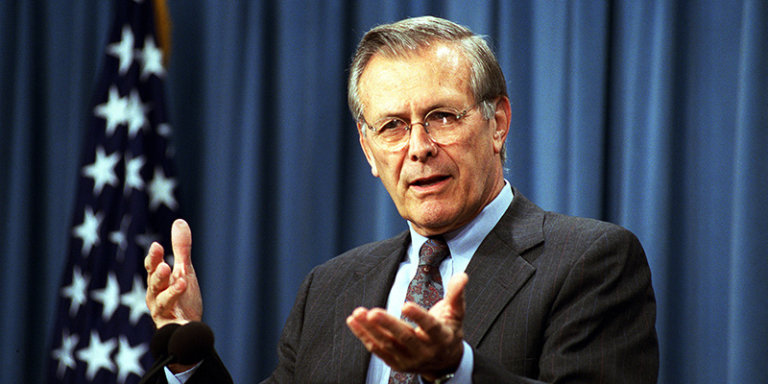
In late June, a long forgotten name popped up in news broadcasts: former US Secretary of Defense Donald Rumsfeld had died at the age of 88 after enjoying a charmed life of success, influence, admiration, and wealth in the elite circles of the US government and multinational pharmaceutical corporations. Rumsfeld, who won a seat as a Republican in the House of Representatives at the age of 30, was both the youngest (in 1975) and the oldest (in 2001) person ever to serve as defense secretary. He was witty, cunning, and arrogant, and despite overseeing the greatest US military disaster of the 21st century—the 2003 American-British invasion and occupation of Iraq—he departed this world enjoying impunity for his crimes and apparently undisturbed by his role in the destruction of the contemporary Middle East and the wrecking of post-World War II international human rights frameworks.
The Neoconservative Connection
Rumsfeld got his job as President George W. Bush’s defense secretary, thanks to Vice President Dick Cheney, with whom Rumsfeld had worked in the Nixon White House in the late 1960s and 1970s. Many during Bush’s presidency joked darkly that Cheney was the actual decision-maker and strategist during the eight tumultuous years between 2001 and 2009. The senior George H.W. Bush, who served one term as president (1989-1993), disliked and distrusted Cheney and Rumsfeld alike. His son, however, had no objections to them taking positions—and indeed, assuming control—during his tenure as president.
American and Israeli policy objectives, as well as a shared total disregard for international humanitarian law and the United Nations, were increasingly inseparable following the September 11, 2001.
Cheney and Rumsfeld, along with George W. Bush Administration figures Paul Wolfowitz, Richard Perle, and Douglas J. Feith, were neoconservatives who pined for the days of former President Ronald Reagan and American global political and military domination. They were also admirers of the Israeli Likud Party governments of Menachem Begin, Yitzhak Shamir, and Ariel Sharon. American and Israeli policy objectives, as well as a shared total disregard for international humanitarian law and the United Nations, were increasingly inseparable following the September 11, 2001, al-Qaeda attacks on the United States. By 2002, both countries proudly subscribed to an aggressive principle of military pre-emption.
As members of the Project for the New American Century, neoconservatives venerated a vision of the United States that, despite its focus on foreign affairs and military interventions abroad, had a lot in common with the domestic anti-democratic and authoritarian tendencies of the Trump regime of 2017. “America First” abroad, without shame or regard for bilateral relationships, characterized the Bush, Jr. years. “America First” at home, without regard for the rule of law, foreign alliances, bipartisanship, or the founding principles of the US Constitution, marked Trump’s administration. Although George W. Bush clearly despised Donald Trump—and even began to look like a good president in comparison—Rumsfeld proudly voted for Trump in 2016.
Similar, Yet Different
The damage Trump did to the United States domestically rivals the damage the Bush, Jr. team did to the international order, but both administrations were similar in their flippant and arrogant attitudes toward the rule of law. First, neither George W. Bush nor Donald Trump won the majority of the popular vote in their respective presidential elections in 2000 and 2016. Both entered office lacking broad-based legitimacy, though the Supreme Court gave George W. Bush’s presidency a patina of legality, and the 2001 al-Qaeda attacks rallied a majority of Americans to his side.
Neither George W. Bush nor Donald Trump won the majority of the popular vote in their respective presidential elections in 2000 and 2016. Both entered office lacking broad-based legitimacy.
While Trump plotted to destroy the US Constitution and expunge the system of checks and balances between the executive, legislative, and judicial branches of the government, Rumsfeld and Cheney were eager to overthrow international law and established an American military protocol to achieve domination over the Middle East. They were so eager to depose Iraq’s Saddam Hussein that they began looking for—and manufacturing—links between the Iraqi dictator and 9/11 mastermind Osama bin Laden and evidence of the former’s weapons of mass destruction (WMDs). They went so far as to set up a separate intelligence apparatus to cast doubt on the Central Intelligence Agency and the Defense Intelligence Agency’s analyses that contradicted the neoconservative delusions about links to al-Qaeda and stockpiles of WMDs.
A fixation on Iraq’s alleged weapons of mass destruction had begun before the George W. Bush Administration entered the White House. A draconian sanctions regime during the Bill Clinton years had left the majority of the Iraqi people crushed by food, medical, and industrial shortages and by the growing power of the regime’s rule-by-terror and its extensive black-market mafia controlling all sectors of the Iraqi economy. But nearly 15 years of sanctions had failed to dislodge the Hussein regime. For the neoconservatives of Bush, Jr.’s administration, this signaled the need for blunt military force—”shock and awe,” as Rumsfeld termed the invasion of Iraq. The September 11 attacks were a kind of godsend for Cheney and Rumsfeld, as well as for the government of Ariel Sharon in Israel, because they helped convince the American public that they were vulnerable and that a response was necessary.
Many of the same people who inhabited the upper echelons of the Reagan Administration in 1982—when Sharon was launching a disastrous regime change operation in Lebanon—filled the ranks of the George W. Bush Administration: Richard Perle, Elliott Abrams, John D. Negroponte, Dick Cheney, John Bolton, and Donald Rumsfeld, to name just a few. Most of these men had long-standing, intimate, and mutually supportive ties with Israel’s Likud Party. Indeed, they endorsed a 1996 policy paper, “A Clean Break: New Strategy for Securing the Realm,” that aimed to help Likud candidate Benjamin Netanyahu formulate an anti-Oslo militarized policy toward the Palestinians and surrounding Arab countries years before the outbreak of the second Intifada in 2000. American neoconservatives, just like their Likud colleagues in Israel, had no regard for due process, international humanitarian law, the United Nations, or diplomatic protocol. Their one-size-fits-all solution to any problem was overwhelming military force, exercised with extreme self-righteousness and gratuitous cruelty.
With a war in Afghanistan already in progress, George W. Bush introduced and lauded a new “policy of preemptive military action” during a speech at the famed West Point military academy in June 2002, signaling that a war with Iraq was in the offing. After getting British Prime Minister Tony Blair on board, the United States proceeded to violate Chapter 7 of the UN Charter criminalizing “Threats to Peace, Breaches of the Peace, and Acts of Aggression,” thereby wrecking the post-World War II architecture of international humanitarian law by instituting torture in Afghanistan and Iraq, creating “black sites” for torturing suspected terrorists in numerous countries in the Middle East and Europe, and last but not least, establishing the legal “black hole” of Guantanamo, where nearly 40 men are still held without charges as “forever prisoners.”
Ironically, the neoconservatives and Likudniks of George W. Bush’s regime, who were eager to bring “democracy” to the Arab-Islamic world by military force, could realize their plans only by first dismantling democracy in the United States. They could not have pulled off this crime without successfully muzzling public debate and strangling participatory grassroots politics at home and abroad. Long before the powerful social media platforms and fake news outlets of today weaponized such malfeasance, the neoconservatives and their cheerleaders in the mainstream media worked overtime to disable critical thought, derail historical consciousness, fragment opposition, and deflect any questions that might expose their true aims. Neoconservatives also showed what they had been planning for over two decades in elegantly appointed offices of some of Washington DC’s wealthiest right wing think-tanks, which were of tremendous help in making the case for war.
Cheney and Rumsfeld had clearly won the battle of wills in the White House and Pentagon when former US Secretary of State Colin Powell, possibly the most circumspect and sensible member of the George W. Bush Administration, was forced to lie in public at the United Nations about Iraq’s nuclear weapons capabilities. Despite CIA claims to the contrary, early in 2003 Powell asserted during the annual elite conference in Davos that there were clear links between Saddam Hussein and al-Qaeda. At the time, few journalists, analysts, policy-makers, or elected representatives were willing to speak publicly about the dangerous repercussions of the Bush Administration’s unilateralist designs in the Middle East. Rare exceptions were columns in The American Prospect by John B. Judis, and especially a damning 2002 analysis by Anatol Lieven, at the time of the Carnegie Endowment for International Peace, who bluntly described the neoconservatives’ Middle East plan as “wicked” and predicted it would cause a devastating and destabilizing regional “conflagration.” The current chaos in Iraq and Syria and the rise of the Islamic State are proof of Lieven’s prescience.
Although Donald Trump, unlike Donald Rumsfeld and George W. Bush, did not engage in military adventurism abroad, his tactics of perverting and ignoring the law, fostering delusions, and fragmenting the American public have many parallels with that other self-aggrandizing bully, Donald Rumsfeld. Like Trump, he was incapable of seeing his own flaws, and never felt a moment of regret for his devastating actions. Arabs and Americans alike will continue to pay the price for the two Donalds’ wickedness.

